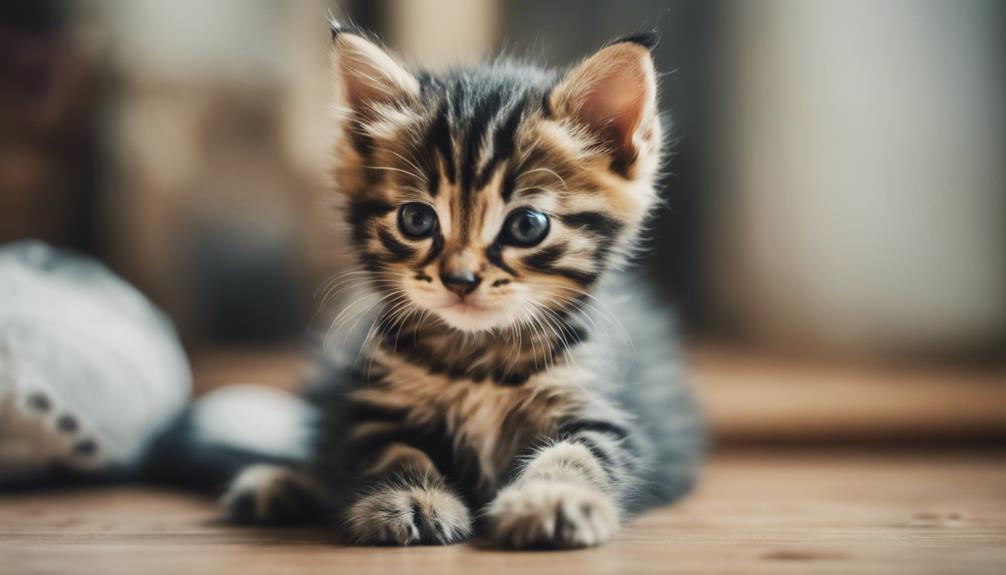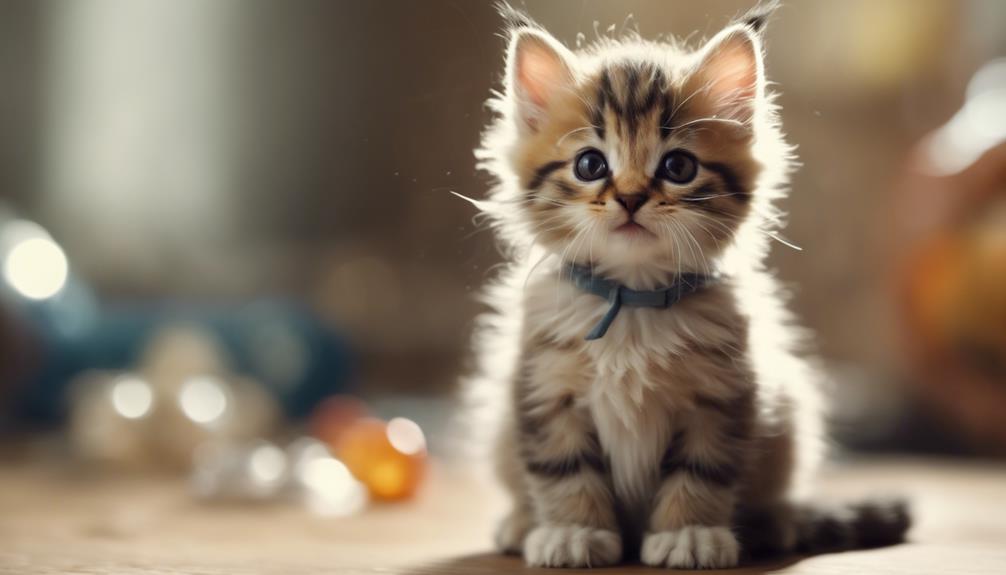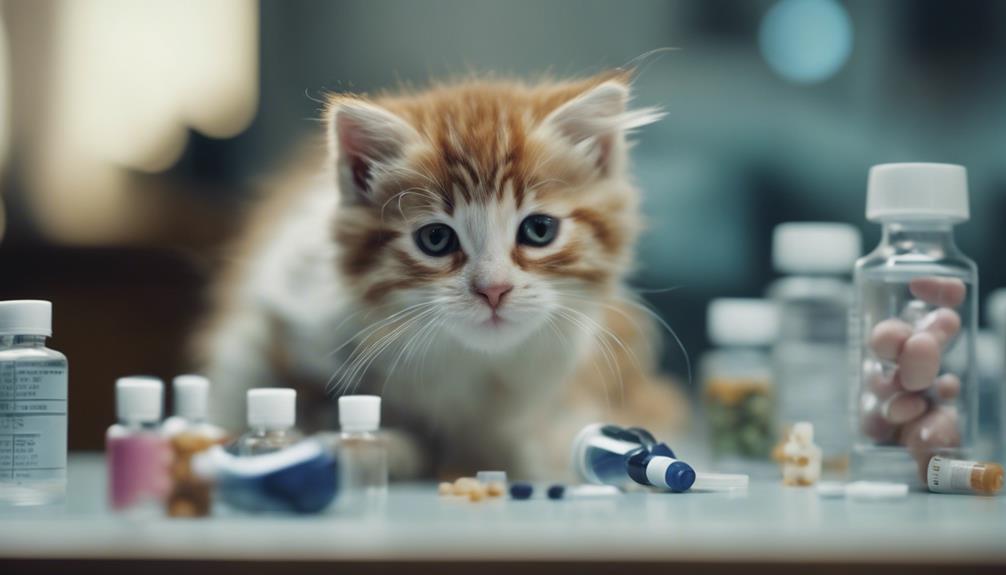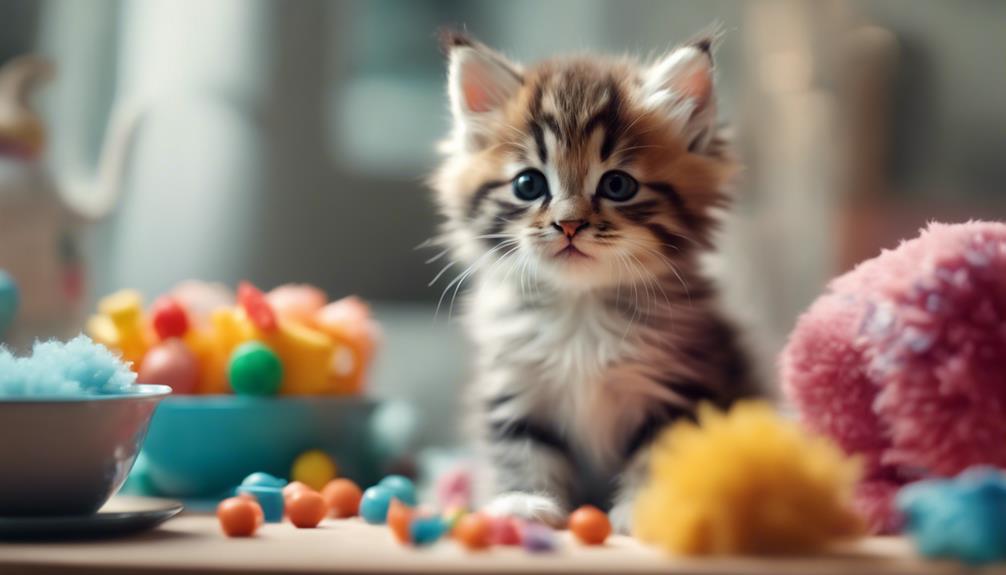In the realm of feline health, the presence of a bloated belly in kittens can be a cause for concern among pet owners. Understanding the underlying reasons behind your wee one's tummy trouble is essential for their well-being.
From common issues like intestinal parasites to more serious conditions such as organ enlargement, a bloated kitten belly can signal various health issues that require attention.
By exploring the potential causes and highlighting the importance of prompt veterinary care, this discussion aims to empower pet owners with the knowledge needed to address their kitten's bloating effectively.
Key Takeaways
- Consult a vet for a bloated kitten's belly to identify the cause accurately.
- Address common causes like parasites, weight gain, or gas promptly.
- Tailor treatment to the underlying issue, including deworming and nutritional adjustments.
- Ensure timely action and regular vet visits for your kitten's health and well-being.
Signs of a Bloated Kitten Belly
Detecting a bloated kitten belly involves observing physical manifestations such as hardness, protrusion, and accompanying symptoms like constipation, diarrhea, vomiting, and decreased energy levels.
These signs can indicate underlying health issues that require prompt attention to ensure your kitten's well-being. It is crucial to pay close attention to any changes in your kitten's belly size or shape, as bloating can be uncomfortable and potentially serious.
If you notice these symptoms, consulting a veterinarian for a thorough assessment is highly recommended. By staying vigilant and seeking timely veterinary care, you can address any bloating concerns and provide the necessary support for your adorable feline companion.
Common Causes of Kitten Bloating
Observing a bloated kitten's belly can prompt concerns regarding various common causes that may contribute to this distressing condition. Intestinal parasites, such as roundworms, are a frequent culprit in kitten bloating. These parasites can lead to gastrointestinal issues, including bloating and discomfort.
Additionally, weight gain, often due to overfeeding or inappropriate diet, can result in a distended belly. Gas accumulation in the digestive tract is another common cause of bloating in kittens, leading to abdominal distension and discomfort.
Identifying these common causes early on and seeking timely veterinary care can help alleviate the kitten's discomfort and prevent further complications. Regular vet visits for deworming, weight management, and nutritional guidance are essential in maintaining a healthy kitten free from bloating issues.
Serious Causes of Kitten Belly Bloating

Serious causes of bloating in a kitten's belly may indicate underlying conditions such as enlarged organs or fluid accumulation in the abdomen, necessitating prompt veterinary evaluation and intervention. These issues can be alarming but addressing them promptly is crucial for your wee one's health. Below is a table summarizing these serious causes:
| Serious Causes of Kitten Belly Bloating | Description |
|---|---|
| Enlarged Organs | Organs like the liver or kidneys may be enlarged, impacting digestion. |
| Fluid Accumulation | Accumulation of fluid in the abdomen, known as ascites, can cause bloating. |
| Tumors or Growths | Abnormal growths in the abdomen can lead to noticeable swelling. |
| Feline Infectious Peritonitis (FIP) | A viral disease causing fluid buildup in the abdomen. |
| Intussusception | Intestinal condition where one part telescopes into another, causing blockage. |
Importance of Vet Consultation
The consultation with a veterinarian is paramount in addressing any concerns regarding a bloated kitten's belly and ensuring the best possible care for the feline's health. Seeking professional advice early on can make a significant difference in the kitten's well-being.
Here are four reasons why vet consultation is crucial:
- Accurate Diagnosis: Vets have the expertise to accurately diagnose the underlying cause of your kitten's bloated belly.
- Tailored Treatment Plan: A vet can provide a personalized treatment plan based on the specific needs of your kitten.
- Preventive Care: Regular vet check-ups can help prevent future health issues and maintain your kitten's overall health.
- Peace of Mind: Consulting a vet can offer reassurance and guidance, making the journey to your kitten's recovery smoother.
Deworming for Bloated Kittens

Upon identifying intestinal parasites as a common cause of bloated kitten bellies, deworming becomes a crucial aspect of their treatment and care. Deworming medications, prescribed by a veterinarian, are essential to rid the kitten's intestines of parasites like roundworms, which commonly affect young felines. These parasites not only contribute to bloating but can also lead to serious health issues if left untreated.
Regular deworming schedules are vital for maintaining your kitten's overall health and well-being. It is important to follow the vet's recommendations regarding deworming frequency and dosage to ensure effective parasite control. By staying proactive with deworming treatments, you can help your kitten recover from bloating and prevent future infestations, promoting a happy and healthy life for your furry companion.
Nutritional Guidance for Kittens
Proper nutrition plays a pivotal role in ensuring the optimal health and development of kittens. When dealing with a bloated kitten, providing the right nutrition is essential for their well-being.
Here are some key nutritional guidance tips to help your kitten thrive:
- High-Quality Kitten Food: Opt for specially formulated kitten food rich in essential nutrients for growth.
- Balanced Diet: Ensure a balanced diet with the right mix of proteins, fats, and carbohydrates.
- Hydration: Keep your kitten well-hydrated with access to fresh water at all times.
- Avoid Overfeeding: Feed your kitten appropriate portion sizes to prevent overeating and bloating.
Treatment Options for Bloated Kittens

Addressing a bloated kitten's condition requires tailored treatment options based on the underlying cause. Deworming medications are commonly prescribed for intestinal parasites, while weight management strategies may be recommended for cases related to weight gain. Regular vet visits are crucial for both prevention and treatment, ensuring the kitten receives proper care and nutritional guidance.
High-quality kitten food plays a significant role in their recovery process. In more severe instances, advanced treatments such as draining excess fluid, specific medications, or even surgery may be necessary. By promptly addressing the root cause of bloating and following the vet's advice closely, your kitten can regain its health and vitality.
Home Remedies for Kitten Bloating
When exploring remedies for bloating in kittens, natural solutions can offer gentle relief and support for their digestive health. Here are some home remedies you can try:
- Warm Compress: Gently apply a warm compress to your kitten's belly to help ease any discomfort caused by gas buildup.
- Gentle Massage: Lightly massage your kitten's belly in a circular motion to promote digestion and alleviate bloating.
- Fennel Tea: A small amount of fennel tea can aid in reducing gas and bloating in kittens when administered in moderation.
- Pumpkin Puree: Adding a small amount of plain, cooked pumpkin puree to your kitten's food can help regulate their digestion and alleviate bloating.
These simple home remedies can provide relief for your bloated kitten while promoting their overall well-being.
Preventative Measures for Kitten Health

Implementing a proactive approach to kitten care involves establishing preventive measures that prioritize their overall health and well-being. By taking steps to prevent common health issues, kitten owners can ensure their wee ones grow up strong and healthy. Below are some key preventative measures to consider:
| Preventative Measures | Description |
|---|---|
| Regular Vet Check-ups | Schedule routine visits for vaccinations, deworming, weight monitoring, and overall health assessments. |
| High-Quality Nutrition | Provide a balanced diet with high-quality kitten food to meet their nutritional needs. |
| Kitten-Proofing Environment | Secure your home to prevent accidents, ingestions of harmful substances, and escapes. |
| Mental & Physical Stimulation | Engage kittens in play, provide scratching posts, and create a stimulating environment for their well-being. |
Timely Action for Kitten Well-being
To ensure optimal health outcomes for kittens, timely recognition and intervention in response to any signs of distress are crucial components of responsible pet ownership. When it comes to your wee one's tummy trouble, acting promptly can make a significant difference in their well-being.
Here are some essential steps to take:
- Observe closely: Monitor your kitten's behavior and belly appearance regularly.
- Consult the vet: Seek professional advice at the first sign of bloating or discomfort.
- Follow treatment plans: Adhere to the vet's recommendations diligently for effective results.
- Provide comfort: Offer gentle care, warmth, and attention to soothe your kitten during their recovery journey.
Conclusion
In the intricate world of feline health, deciphering the root cause of a kitten's bloated belly is essential for their well-being. By exploring the signs, causes, and treatment options, pet owners can navigate through the complexities of tummy troubles with vigilance and care.
Remember, a proactive approach and timely intervention are key to safeguarding your kitten's health. Stay informed, stay attentive, and ensure your furry companion thrives in good health.




